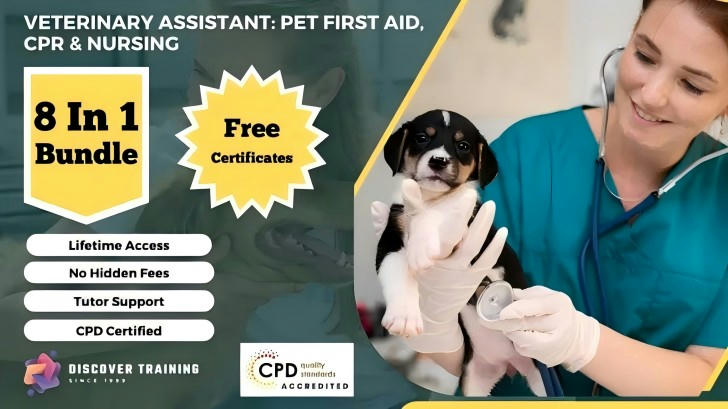Kickstart Your Career for Free: How to Find Veterinary Assistant Courses at No Cost
Starting a career as a veterinary assistant can be rewarding, but training costs can be a hurdle for many. Luckily, there are free resources that provide the skills and knowledge needed to enter this field. In this guide, we’ll show you how to find quality, no-cost veterinary assistant courses and set you on a path to success without breaking the bank.
Employment Outlook for Veterinary Assistants

Veterinary assisting is a field with strong job prospects and opportunities for growth. The demand for skilled veterinary assistants is expected to continue as pet ownership rises and veterinary practices expand. Entry-level veterinary assistant positions provide hands-on experience and a solid foundation for advancing into roles like veterinary technician, which offers higher pay and additional responsibilities. Starting as a veterinary assistant not only offers a stable income but can also be a stepping stone to a long-term career in animal health.
Salary Potential for Veterinary Assistants
One of the appealing aspects of a career as a veterinary assistant is the competitive salary, especially when compared to other entry-level healthcare roles. However, the pay varies depending on factors such as location, experience, and the specific responsibilities of the position.
Here is a breakdown of the typical salary range for veterinary assistants, along with what you can expect after advancing to a higher role:
| Position | Average Annual Salary (US) | Salary Range |
|---|---|---|
| Veterinary Assistant (Entry-Level) | $30,000 | $25,000 - $35,000 |
| Veterinary Assistant (Experienced) | $35,000 | $30,000 - $45,000 |
| Veterinary Technician | $42,000 | $38,000 - $55,000 |
| Veterinary Technician (Advanced) | $52,000 | $45,000 - $65,000 |
| Veterinarian | $100,000+ | $80,000 - $130,000+ |
Source: U.S. Bureau of Labor Statistics (BLS) and PayScale
As the table shows, while entry-level veterinary assistants earn an average of around $30,000 annually, those who gain experience and further training can see their salaries rise significantly. Advancing into a veterinary technician role can nearly double your earnings, and becoming a veterinarian can lead to a high salary range, making it a lucrative career path for those who continue their education.
Real Case
Consider the real-life example of Emily, who started her career in a small animal shelter as a volunteer. Passionate about helping animals, she wanted to pursue a veterinary assistant role but lacked formal training. By researching free educational resources, she enrolled in a veterinary assistant course offered online. After completing the course, Emily was able to secure a paid position at a local animal clinic. Within a few years, she gained enough experience and training to advance into a veterinary technician role, doubling her income and taking on greater responsibilities in animal care.
If you’re interested in starting a similar journey, here are some of the best channels to find free veterinary assistant courses and gain the skills needed for a successful career.

Free Learning Channels
1. Online Learning Platforms
Websites like Alison, Coursera, and EdX offer free or audit-only options for veterinary assistant courses. While full certifications might require a fee, the content itself is often available at no cost. Look for courses covering basic animal care, medical terminology, and veterinary ethics, as these are essential foundations for working in animal care.Certificates of study are also available.
2. Nonprofit and Government Resources
Some nonprofits and local government programs provide training in animal care as part of workforce development initiatives. Organizations such as the ASPCA or Humane Society occasionally offer free workshops or online training. These programs can serve as a good introduction to veterinary assisting, and may help you gain valuable experience that sets you apart when applying for entry-level positions.
3. Veterinary Clinics and Animal Hospitals
Many veterinary clinics, animal hospitals, and shelters provide on-the-job training for entry-level roles. Volunteering or applying for internships allows you to gain real-world skills, and some clinics might offer introductory training at no cost. This not only helps build connections in the veterinary community but also allows you to assess the workplace environment.
4. Library Resources and Open Courseware
Public libraries often partner with online learning platforms and may grant free access to educational content, including courses in animal care. Additionally, websites like OpenCourseWare by institutions like MIT offer modules on biology and animal health, which can help build a foundation in science and animal care.
5. Community Colleges and Workforce Programs
Some community colleges offer veterinary assistant courses for free as part of workforce development initiatives. These are typically limited to specific areas and may require eligibility checks, but they provide hands-on training without the burden of tuition.
6.Social Media and Online Forums
Veterinary professionals and educators often share free resources, tips, and even workshops on platforms like LinkedIn, Facebook, and Reddit. Following industry groups and joining forums can help you discover hidden gems in free veterinary training opportunities.

Conclusion
With the right training, becoming a veterinary assistant can open doors to a high-reward career, offering stability, satisfaction, and room for advancement. By exploring these free course options, you’ll be equipped to pursue a role that makes a meaningful difference in the lives of animals and provides a strong foundation for career growth. Take advantage of these resources to set yourself on the path to a fulfilling and impactful career in veterinary care.
